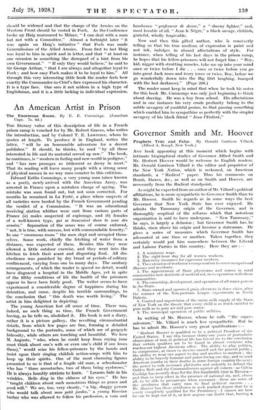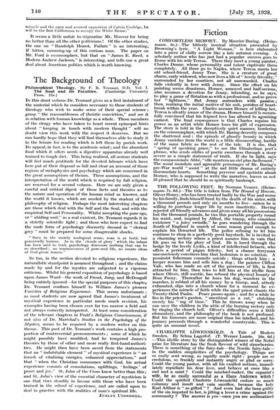Governor Smith and Mr. Hoover
ANY book appearing at this moment which begins with intimate biographical studies of Governor Alfred Smith and Mr. Herbert Hoover would be welcome to English readers. Mr. Oswald Garrison Villard is the editor and proprietor of the New York Nation, which is reckoned, on American standards, a " Radical " paper. Thus his comments on Borah, Dawes, &e., as well as on Smith and Hoover, are necessarily from the Radical standpoint.
As might be expected from an author of Mr. Villard's political affiliatiOns, he is more sympathetic to Governor Smith than to Mr. Hoover. Smith he regards as in some ways the best. Governor that New York State has ever enjoyed. He admits the Tammany origin of the Governor, and is thoroughly sceptical of the reforms which that notorious organization is said to have undergone. " New Tammany," he says, is largely a delusion ; but Governor Smith has, he thinks, risen above his origin and become a statesman. lie gives a series of measures which Governor Smith has advocated at one time or another. Taken together, they certainly would put him somewhere between the Liberal and Labour Parties in this country. Here they are :— 1. A minimum wage.
2. The eight-hour day for all women workers. 3. Maternity insurance for expectant mothers. 4. The extension of workmen's compensation to cover occupul ional illnesses and accidents. 5. The appointment of State physicians and nurses in rural communities now destitute of medical aid, in co-operation with those communities.
6. The ownership, development, and operation of all water-powers in the State. 7. State owned and operated grain elevators in three cities, after the manner of the Non-partisan League experiments in North Dakota.
8. Control and supervision of the entire milk supply of the State of New York on the theory that every child is as much entitled to- pure milk as to pure air and pure water.
9. The municipal operation of public utilities.
In writing of Mr. Hoover, whom he calls " the super- salesman," Mr. Villard is much less sympathetic. But he has to admit Mr. Hoover's very great qualifications :-
" Herbert Hoover is qualified to be a political President of the United States. I say this because thirty-one years of journalistic observation of men in political life has forced mu to the conclusion that certain qualities are to be found in almost everyone who reaches our highest American office. The ability to play politks, to compromise, at times to deceive oneself and the general public ; the ability to wear one aspect to-day and another to-morrow ; the ability to be bravely humane and peace-loving one day, and to send American youths to their deaths in some foreign country the next ; the power to talk incessant platitudes and ardently to defend the Golden Rule and the Commandments against all comers—as Calvin Coolidge has recently done for the five-hundredth time in Havana— and then to keep silent in the presence of national sin, and, above all, to be able to prevaricate when necessary—these are some of the attributes that carry men to final political success.. . . Mr. Hoover has these attributes in such marked degree that he is surely completely qualified for the Presidency—I cannot see how he. can be kept out of it, or how anyone can doubt that, barring a miracle and the open and avowed opposition of Calvin Coolidge, he will be the first Californian to occupy the White House."
It seems a little unfair to stigmatize Mr. Hoover for being no better than all the other politicians Of the other studies, the one on " Randolph Hearst, Failure " is an interesting, if bitter, summing-up of this curious man. The paper on Mr. Ford is commonplace, but that on "James E. Reed, a Modern Andrew Jackson," is interesting, and tells one a great deal about American politics which is worth knowing.





































 Previous page
Previous page